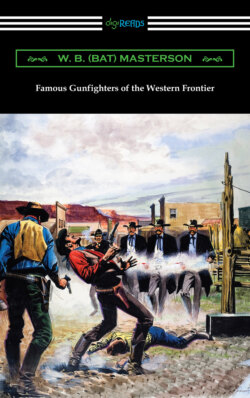Читать книгу Famous Gunfighters of the Western Frontier - W. B. (Bat) Masterson - Страница 5
На сайте Литреса книга снята с продажи.
William Barclay (Bat) Masterson
ОглавлениеWilliam Barclay (Bat) Masterson has been engaged by Human Life to write a series of articles on the great old time gun-players of the West. The sketch in this issue considers Ben Thompson, whose name is as well known in Texas, and almost as well regarded in Austin at least, as that of General Sam Houston or Deaf Smith. Mr. Masterson himself is singularly well equipped for the task at hand. He will, from month to month, give us biographical and personal articles on Doc Holliday, Wyatt Earp, Buffalo Bill, Wild Bill Hickok, Charlie Ford, who killed Jesse James, Frank James, Clay Allison, Luke Short, and others once foremost among this hard-riding, quick-shooting chivalry of the plains. These men were the personal friends of Mr. Masterson. They have slept in his blankets, cooked by his campfire. Mr. Masterson has himself witnessed stirring times, and stood for years a central and commanding figure in a dangerous day that has gone. His life on the plains began when he was seventeen years old. He has been a buffalo hunter, Indian trader, Indian fighter. He was scout for Miles under the great Ben Clarke—now interpreter at the Cheyenne Agency—in the Indian war of 1874. He was in the weeks’ war at the ’Dobe Walls on the Canadian, when he and thirteen other buffalo hunters fought five hundred of the picked bucks of the Cheyenne, Comanche, Kiowa and Arapaho tribes, beat them and killed over eighty of them. Later, at the age of twenty-two, Mr. Masterson was elected sheriff of Ford county, Kansas, with headquarters at Dodge City, making a territory three hundred miles east and west by almost as many north and south. Dodge in that day was reckoned the roughest camp on the border. It was the northern terminus of the Jones and Plummer Trail, over which the beef herds came up from Texas. With them the cowboys—full of life, vivacity, and fight. It took a sure, cool hand to keep the peace in Dodge. That Mr. Masterson did not succeed in doing so without a struggle is evidenced by the fact that in the desperate combats of the pistol which ensued, he was driven to kill variously Walker, Wagner, Kennedy, Updegraffe and King, every one of whom was a “bad man,” and had a gun in hand when he fell. But that day is past and Mr. Masterson is no longer a queller of “bad men,” but a resident of New York and a contributor of the press. Also he is a warm personal friend of President Theodore Roosevelt, who caused him to be named Deputy United States Marshal for the Southern District of New York. President Roosevelt, following his election, was for naming Mr. Masterson Marshal in the Indian Territory. The place has twice the salary of the one he holds and carries with it the name of twenty-two deputies, and yet Mr. Masterson declined it. “It wouldn’t do,” he said. “The man of my peculiar reputation couldn’t hold such a place without trouble. If I were to go out to the Indian Territory as Marshal, I can see what would happen. I’d have some drunken boy to kill once a year. Some kid who was born after I took my guns off would get drunk and look me over, and the longer he looked the less he’d be able to see where my reputation came from. In the end he’d crawl around to a gun play and I’d have to send him over the jump. Almost any other man could hold office and never see a moment’s trouble. But I couldn’t. My record would prove a never-failing bait to the dime novel reading youngsters, locoed to distinguish themselves and make a fire-eating reputation, and I’d have to bump ’em off. So, Mr. President, with all thanks to you, I believe I won’t take the place. I’ve got finally out of that zone of fire and I hope never to go back to it.” It was then that President Roosevelt did the next best thing, and caused Mr. Masterson’s appointment as Deputy United States Marshal in New York.—Editor.
